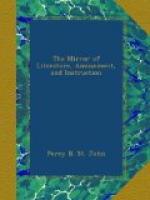* * * * *
UNSPOKEN WATER.
In Scotland, water from under a bridge, over which the living pass and the dead are carried, brought in the dawn or twilight to the house of a sick person, without the bearer’s speaking, either in going or returning, is called Unspoken Water.
The modes of application are various. Sometimes the invalid takes three draughts of it before anything is spoken. Sometimes it is thrown over the houses the vessel in which it was contained being thrown after it. The superstitious believe this to be one of the most powerful charms that can be employed for restoring a sick person to health.
The purifying virtue attributed to water, by almost all nations, is so well known as to require no illustration. Some special virtue has still been ascribed to silence in the use of charms, exorcisms, &c. I recollect, says Mr. Jamieson, being assured at Angus, that a Popish priest in that part of the country, who was supposed to possess great power in curing those who were deranged, and in exorcising demoniacs, would, if called to see a patient, on no account utter a single word on his way, or after arriving at the house, till he had by himself gone through all his appropriate forms in order to effect a cure. Whether this practice might be founded on our Lord’s injunction to the Seventy, expressive of the diligence he required, Luke x. 4, “Salute no man by the way,” or borrowed from heathen superstition, it is impossible to ascertain. We certainly know that the Romans viewed silence as of the utmost importance in their sacred rites. Hence the phrase of Virgil,—–




